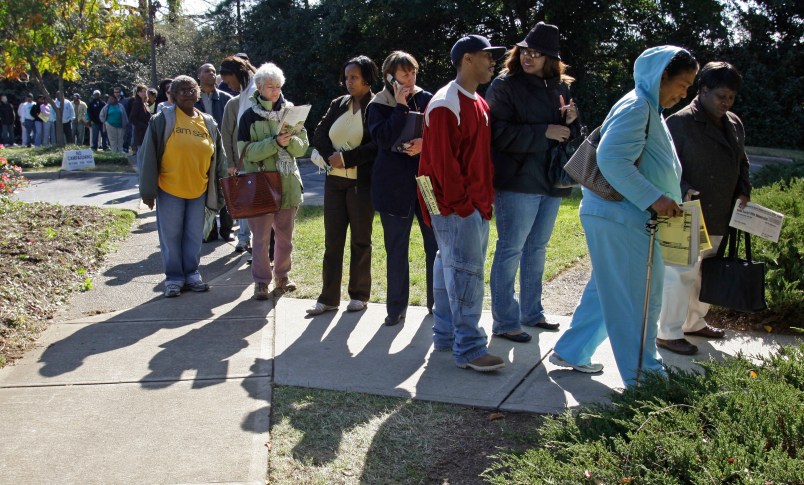On the heels of appeals court ruling that restored a week’s worth of early voting in North Carolina, the executive director of the state’s Republican Party emailed a memo to members of local elections boards urging them to push for “party line changes” that cut back on early voting hours, The News and Observer reported.
The memo, sent by NCGOP executive director Dallas Woodhouse on Sunday, said that Republican board members “should fight with all they have to promote safe and secure voting and for rules that are fair to our side.”
“Our Republican Board members should feel empowered to make legal changes to early voting plans, that are supported by Republicans,” Woodhouse wrote. “Republicans can and should make party line changes to early voting.”
Last month, a panel of judges on the 4th U.S. Circuit Court of Appeals struck down a 2013 law passed by the state‘s Republican legislature that cut back early voting in the state from 17 days to 10 days, ruling that it intended to discriminate against African Americans. Other voting restrictions in the law were struck down as well. The state has asked the Supreme Court to halt parts of the ruling and allow North Carolina to keep its cutbacks to early voting, among other provisions.
The memo came as local election boards are working on schedules for early voting that take into account the appeals court decision. Per the News and Observer:
County elections boards are developing new early voting schedules in response to a federal court ruling that threw out the state’s voter ID law. In addition to revoking North Carolina’s photo ID requirement, the ruling requires counties to offer 17 days of early voting.
The voter ID law limited early voting to a 10-day period, but counties were required to offer at least the same number of voting hours as they did during the 2012 election. The court ruling eliminates that floor on hours – meaning that counties can legally provide fewer hours and fewer early voting sites than they did in the last presidential election.
Woodhouse’s memo warmed that “Democrats are mobilizing for a fight over early voting locations and times.”
“They are filling up election board meetings and demanding changes that are friendly to democrats and possibly voter fraud,” he wrote.
Among the recipients of his memo were Republican officials who sit on the three-member county boards that approve election schedules in each county. In North Carolina, the governor appoints members to the State Board of Elections which in turn appoints members to the county boards, where two members are allowed to be members of the same party and are typically recommended by the state party chair. Because North Carolina has a Republican governor, two out of the three on each board are currently Republican, according the News and Observer.
Woodhouse went on to write in the memo that cutbacks to early voting hours were necessary because the extra week allowed for same-day registration, which the appeals court decision also brought back after it was eliminated by the 2013 law.
“We believe same-day registration is ripe with voter fraud, or the opportunity to commit it,” he said. “Same-day registration is only available during early voting. We are under no obligation to offer more opportunities for voter fraud.”
UC-Irvine Law Professor Rick Hasen pointed out on his Election Law Blog that early voting is not known to increase the chances of voter fraud. Same-day registration is, however, used disproportionately by black voters.
Woodhouse railed against early voting hours on Sundays, a day that is also popular for voting among African-Americans due to the tradition of black churches’ “souls to the polls” drives.
“Many of our folks are angry and are opposed to Sunday voting for a host of reasons including respect for voter’s religious preferences, protection of our families and allowing the fine election staff a day off, rather than forcing them to work days on end without time off,” Woodhouse wrote. “Six days of voting in one week is enough. Period.”
Woodhouse also pushed elections board officials away from putting early voting sites on college campuses.
“No group of people are entitled to their own early voting site, including college students, who already have more voting options than most other citizens,” Woodhouse wrote.
Since the appeals court decision, there already has been some debate at the local level over early voting in North Carolina. Woodhouse’s own cousin, Eddie Woodhouse, the newest member of the Wake County elections board, tried unsuccessfully last week to push the board to eliminate early voting on Sunday and to remove an early voting site from North Carolina State University.
Dallas Woodhouse, the GOP executive director, defended his memo in an interview with the News and Observer.
“I’m an unabashed partisan, and we have dozens and dozens of Democracy N.C. and NAACP and other people flooding these meetings asking for partisan considerations,” he said. “Our members have a duty, I believe, to act within the law to at least consider the Republican point of view. That’s all we ask them to do.”







Sucks to be the Tarheel GOP, especially if your parent’s hated you enough to stick you with the name “Dallas Woodhouse”.
But what if that goes against my religious beliefs to do that? Oh, wait, that’s just for fetuses, homosexuals and the Pill! I keep forgetting.
Respecting religion and safety? Sounds to me that the about statement disrespects the very religion that they purport to believe in.
Another boil pops … spews pus —
I’m sure Chief Justice Roberts will get around to restoring the Voting Rights Act preclearance requirement any day now. It’s not like he could have anticipated this sort of thing – aside from the laundry list of bad acts that RBG cataloged in her dissent.